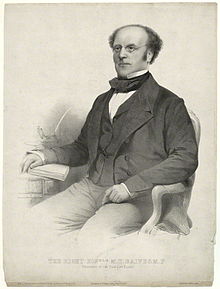Matthew Talbot Baines
|
The Right Honourable Matthew Talbot Baines QC DL |
|
|---|---|
 |
|
| President of the Poor Law Board | |
|
In office 1 January 1849 – 21 February 1852 |
|
| Monarch | Victoria |
| Prime Minister | Lord John Russell |
| Preceded by | Charles Buller |
| Succeeded by | Sir John Trollope, Bt |
|
In office 30 December 1852 – 13 August 1855 |
|
| Monarch | Victoria |
| Prime Minister | The Earl of Aberdeen |
| Preceded by | Sir John Trollope, Bt |
| Succeeded by | Hon. Edward Pleydell-Bouverie |
| Chancellor of the Duchy of Lancaster | |
|
In office 7 December 1855 – 21 February 1858 |
|
| Monarch | Victoria |
| Prime Minister | The Viscount Palmerston |
| Preceded by | The Earl of Harrowby |
| Succeeded by | The Duke of Montrose |
| Personal details | |
| Born |
17 February 1799 Leeds, Yorkshire |
| Died | 22 January 1860 (aged 60) |
| Nationality | British |
| Political party | Whig, Liberal |
| Alma mater | Trinity College, Cambridge |
Matthew Talbot Baines QC, DL (17 February 1799 – 22 January 1860) was a British lawyer and Liberal politician. He most notably served as Chancellor of the Duchy of Lancaster in Lord Palmerston's 1855 to 1858 administration.
Born at Leeds, Yorkshire, Baines was the eldest son of Edward Baines, a noted journalist and minor politician, by Charlotte, daughter of Matthew Talbot.Sir Edward Baines was his younger brother. He was educated at Richmond School and Trinity College, Cambridge, where he graduated in 1820.
Baines was called to the bar in 1825 and established a successful legal practice. In 1837 Baines was appointed Recorder of Hull, and in 1841 he became a Queen's Counsel. Baines then turned to politics and was elected to parliament for Kingston-upon-Hull in 1847, a seat he held until 1852, and subsequently represented Leeds until 1859. Only two years after entering the House of Commons, he was appointed President of the Poor Law Board in the Whig administration of Lord John Russell. In July 1849 he was also admitted to the Privy Council. The Liberals fell from power in February 1852, but in December of the same year he was once again appointed President of the Poor Law Board, this time in the coalition government headed by Lord Aberdeen.
...
Wikipedia
